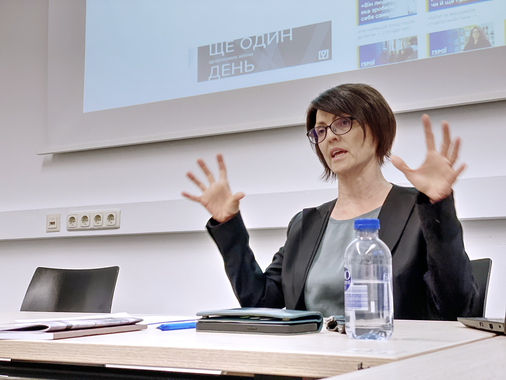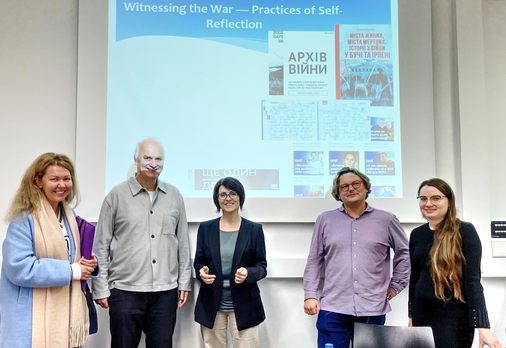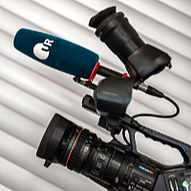Witnessing the War in Ukraine
UR visiting scholar Natalia Khanenko-Friesen, University of Alberta, Canada, about testimony research and academic accountability.
13 December 2023
The ongoing war in Ukraine might be among the “most documented wars ever”, thereby actively redefining the field of historical knowledge production. On 7 November 2023, Professor Dr. Natalia Khanenko-Friesen, who was a visiting scholar at the University of Regensburg (UR), shared her thoughts about the burgeoning field of war testimony documentation as well as the methodological challenges present in this field. Scholars and students took part in her talk that asked difficult questions regarding a dynamically evolving area of study. Who is equipped to do such research and who is not? Who has the right to tell their story? Who has the right to document what is going on? How is evidence gathered, how is it shared, and when? Finally: What will go to the archives?
Concerned with the future of the collected evidence, the historian and cultural anthropologist (currently serving as the Director of the Canadian Institute of Ukrainian Studies) at the University of Alberta in Canada, thus asked her audience difficult questions. “When it comes to war testimony research taking place right now, we have to worry about the future contents of our research archives,” Khanenko-Friesen pointed out. “We should be treating testimonies not only for immediate release but as historical sources for researchers in the future.”
Being a long-term practitioner of oral history, she has been collecting the voices of marginalized peasants, displaced persons, illegal migrants, and members of the Ukrainian diaspora around the world for years in her projects.The scholar was invited to Regensburg by UR-historian Professor Dr. Guido Hausmann who considers Khanenko-Friesen’s visit as a fruitful starting point for further developments of Regensburg-Canadian academic relations in the field of history.

Prof. Dr. Natalia Khanenko-Friesen, University of Alberta, Canada, during her lecture in Regensburg. Photo: Tanja Wagensohn/UR
Exploring the field of testimony research in Ukraine
Khanenko-Friesen is an oral history expert with a deep appreciation for ethical and methodically sound approaches to the collection and study of (witness) testimony. In the current context, she asserts, with so many researchers entering the field of testimony collection, there are several important questions to address: Are those currently collecting war testimonies trained to do so? Oftentimes they are not. Who is paying for the testimony research and what happens with gathered data? If collected in Ukraine, is the evidence being ‘sent’ away, for further analysis out of Ukraine? Where are the interviews stored? Do respondents know where their testimonies are and who has access to their accounts?
When it comes to Ukraine, the scope for evidence gathering is overwhelming, while resources to train and prepare the new cohort of researchers and documentarians for the work to be done on the ground are nearly non-existent. Trained researchers who did not leave Ukraine as refugees continue to work in the field, while many other newly minted documentarians began stepping in. Amongst those are volunteers, national and international NGOs, and private foundations all seeking to promptly document the war experience while it is still ‘fresh’. Some embrace the responsibility of ethical research, others do not.
Another challenge to careful documentation of war testimonies is the long-adopted culture of immediate informational release. “Our digital environment has long built in us the expectation of immediate gratification,” Khanenko-Friesen said. The world wants to read about Ukraine and what is going on there. Therefore, probably thousands of people have by now entered the field of evidence production – without being trained, actively releasing testimonies into the public domain.
In addition to testimony collected using interviews, personal self-reflectivity and self-documentation of war experiences is exploding. Such reflections are offered online and on various digital platforms. There are (video) and journal diaries, produced by civilians or military.
Oral history as advocacy
Many of those collecting testimonies are driven by a sense of advocacy, and the testimonies are shared for particular purposes. Accounts are collected by journalists, scholars, or public historians who lead and channel such reflections to match their own research or advocacy purposes.
Personal accounts based on individual experience always carry within themselves a sense of built-in authenticity. Therefore, “we should be aware that this brings into the research vectors of emotionality and morality”, explained the speaker. “In oral history, we are aware of that – we know how to examine this dimension and locate it within the provided evidence. If you are not trained to recognize these layers of narration in the gathered testimony, you may not be able to differentiate between what we call different kinds of truth documented in the interview.”
Emotionality, morality, ethics
Overall, Khanenko-Friesen is interested in systemic scholarly research into the war. In February 2022, she started the project that later received the title "365 Days of Oral History of the War" and established a database with interview-based projects on witnessing the impact of the Russian war in Ukraine. 108 projects focusing on personal testimony were identified – among them video chronicling, blogs or vlogs; besides that, 65 projects gathered testimonies by means of interviews.
Among them are small and large projects, such as “Voices of Peaceful” which has more than 62,000 individual stories.
Khanenko-Friesen and her team analyzed which research groups were involved in the projects, where they originated from, and in which countries and (Ukrainian) cities the research was conducted. The unfolding events of the war present a huge analytical challenge to the historians,” Khanenko-Friesen explained. “Historians are not used to writing about the unfinished past”. At the same time, scholars representing social sciences are quite used to working with the unfolding present.
Risks and methodical challenges
This disciplinary diversity in the domain of oral history informs some productive tensions within the field of current testimony research, with some researchers diving into immediate documentation and others taking their time and pointing out methodological challenges of pursuing the oral history of the unfinished present. The recently revived Ukrainian Oral History Association, of which Khanenko-Friesen is a co-president, is actively engaged in public discussions of both approaches while also sharing its professional expertise with those needing it in their oral historical projects in the regions.
Among the findings: with the war in the active phase, the question of ethics is the most important one that researchers should be concerned with. With the war ongoing, the risks for interviewers and interviewees can be high and the protection of personal identity is a must. “There is a huge need for safeguarding documented records properly,” Khanenko-Friesen said.
Within the field of testimony research, some tensions have been produced by “different positionalities dictating different degrees of moral responsibility”. There are native and non-native researchers, scholars living in Ukraine and those outside. There are research teams focused on quantity, while others focus on quality of documentation instead. Khanenko-Friesen also brought up the issue of ethics in the context of such research practices when Western scholars hire and pay local researchers, oftentimes working in dangerous conditions, to conduct interviews.
The other challenge in the field is that some native researchers have undergone much trauma due to the war. If in the past these researchers documented the events as external observers and thus outsiders, they are now trying to document the experience of which they are a part.
Natalia Khanenko-Friesen with Guido Hausmann (IOS, UR, l.), Paul Vickers (UR DIMAS, Leibniz ScienceCampus, r.) and two lecture guests. Photo: Tanja Wagensohn/UR
Orality, narration, validity
Much testimony collected today is recorded in the context of oral narrative communication and exchange between two interlocutors. Therefore, evidence gathered should be assessed in terms of its orality, performativity, narrativity and vernacularity. Such orally gathered accounts are only one version of how a person would be relating his/her experience. These accounts are dialogic, with the interview setting meaning they can go in very different directions. Thus, “oral testimony produced in the interview setting is very much the outcome of the interaction between people involved in the conversation and thus, it is also created in response to the interlocutor’s desire to hear a respondent out.”
Depending on the time that has lapsed since the event and recollection, there are different kinds of narratives. Reactionary narratives are immediate reactions; they are told in the wake of the disaster and can contain unprocessed trauma. As a rule, they are less coherent. More reflective narratives are normally shared when more time passes after the traumatic events. They are commonly more coherent. If told for social purposes – for justice, to punish the perpetrators – they become public testimonios and are repeated from one context or another. It is also important to remember that “with many repetitions, in front of different audiences, the recalled past becomes narrativized and shared public memory is forged.”
When oral historical research is conducted by the proper methodological framework, and many representational and diverse voices are recorded and analyzed, assessing the validity, subjectivity and objectivity of the evidence gathered is possible. For this to happen, though, both interviewing and analysis of the interviews should be conducted by professionally trained researchers. “Only then current testimonies will become valid historical sources for future researchers,” the researcher said.
Information/Contact
About Professor Dr. Natalia Khanenko-Friesen, University of Alberta, Canada
About the project „365 Days of Oral History”
About Prof. Dr. Guido Hausmann, IOS, University of Regensburg





